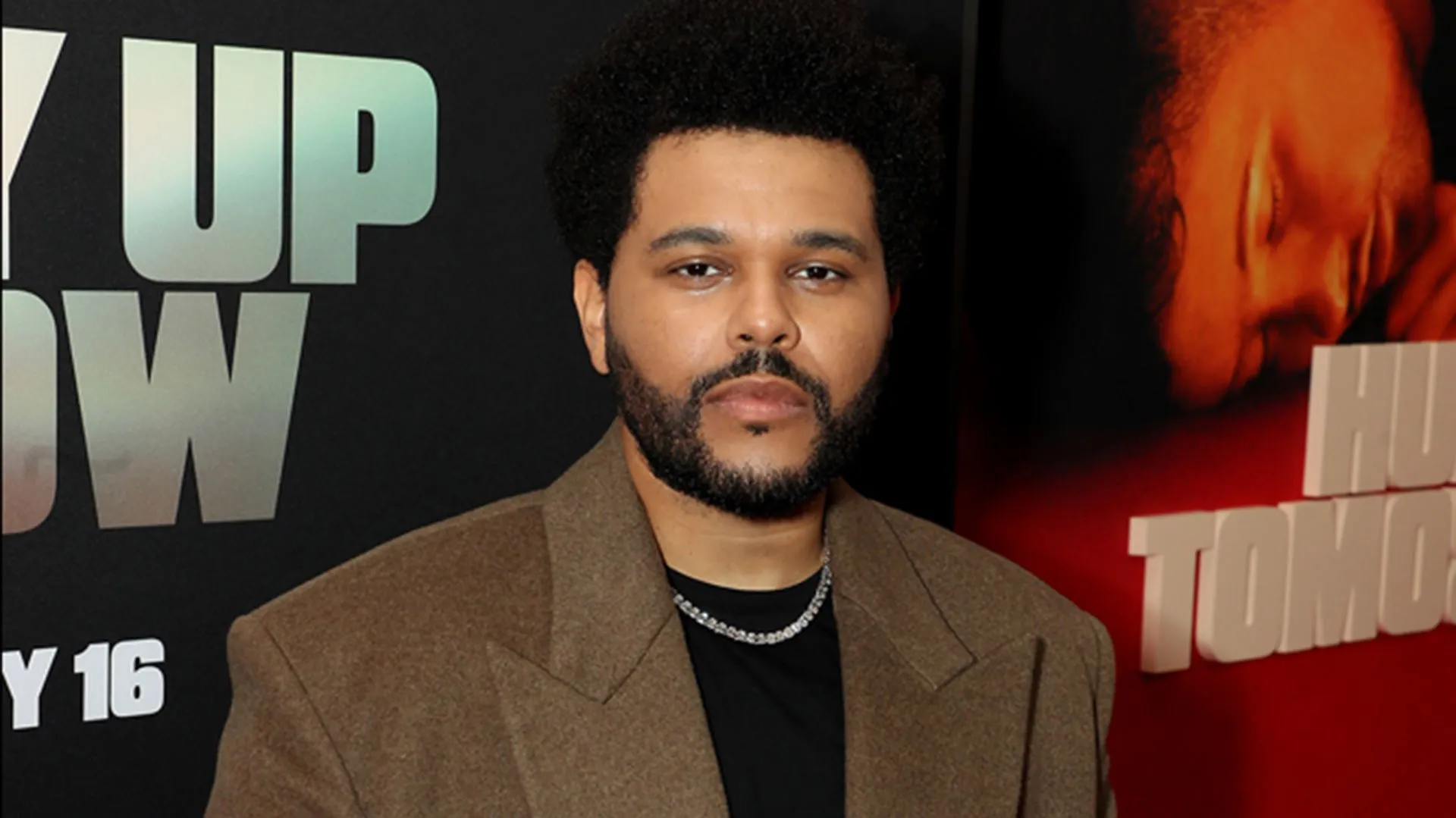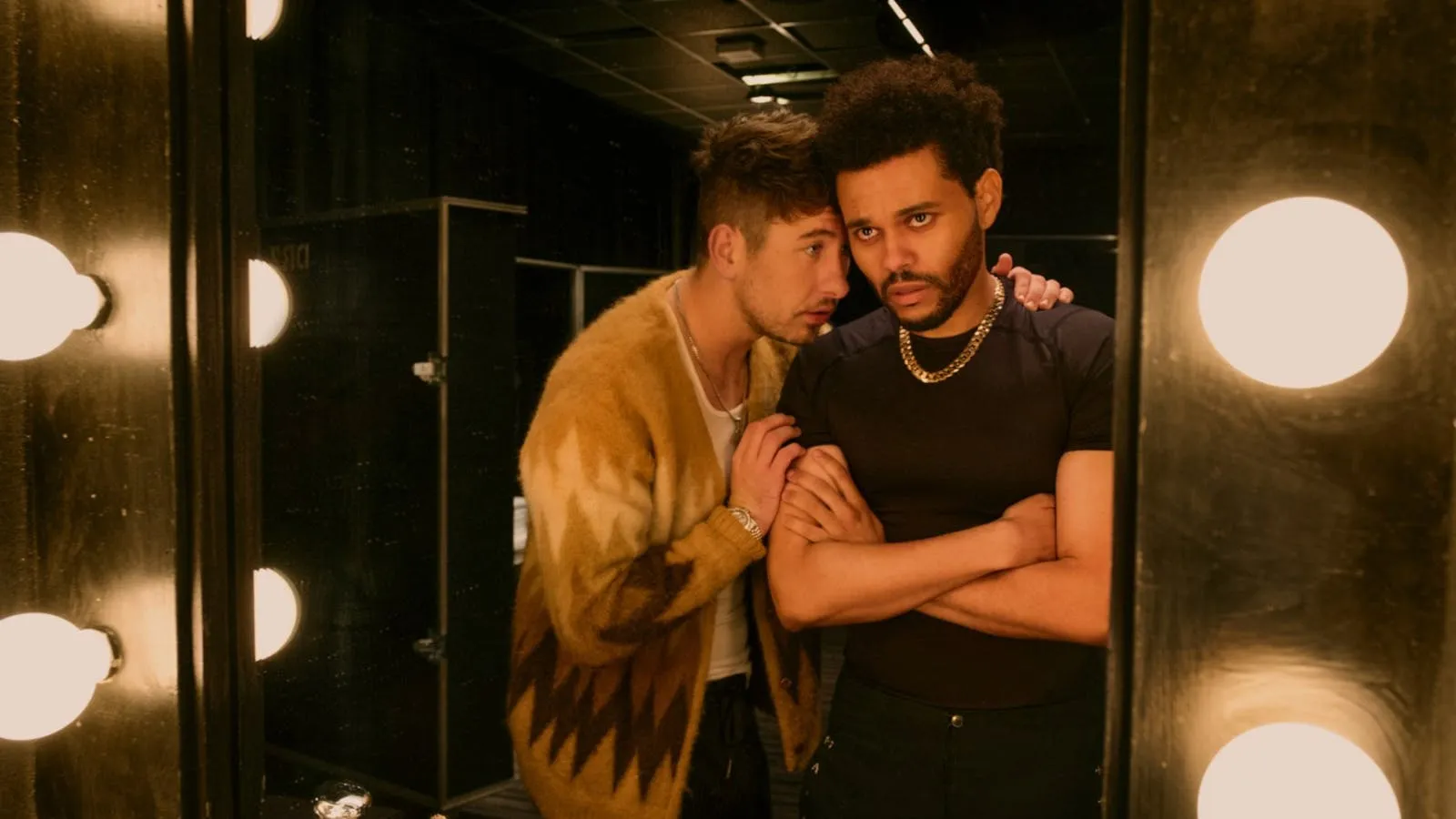

What Went So Wrong? The Weeknd’s Movie Scored a Brutal 0% — And Not Even Jenna Ortega Could Save It
In the ever-evolving landscape of celebrity crossovers, few figures have taken bigger swings than The Weeknd, the Grammy-winning pop icon turned cinematic auteur. When news broke that he was co-writing, co-producing, and starring in a new film — a psychological thriller with none other than Jenna Ortega and Barry Keoghan — the entertainment world buzzed with anticipation. With a cast packed with critical darlings, and the promise of a mind-bending narrative, expectations skyrocketed.

And yet, in an almost unfathomable twist, the movie landed with a thud. Not just a disappointing debut — but a 0% rating on Rotten Tomatoes. A score so rare, so scathing, that it demands a closer look. What went wrong with The Weeknd’s cinematic debut? How did a project with so much star power, creative energy, and marketing muscle collapse so thoroughly in the eyes of critics and audiences alike?
Let’s unravel the wreckage of what was once considered one of the most anticipated artistic experiments of the year.
The Weeknd’s Leap into Film: Ambition Without Direction
Abel Tesfaye, better known as The Weeknd, has never been one to color inside the lines. His music has long blended dark, nihilistic themes with pop polish, and he has shown a flair for world-building — whether through the dystopian aesthetic of “After Hours” or the retro-futuristic vibes of “Dawn FM.” It’s not surprising that he would eventually try his hand at storytelling in a more visual form.
But there’s a monumental difference between crafting a cinematic album and executing a feature-length film. While The Weeknd’s previous short films and music videos displayed artistic ambition, his feature film debut felt more like an over-extended music video than a fully-formed movie. Critics noted that the plot was disjointed, the dialogue cringe-worthy, and the tone uneven — an unfortunate consequence of too many creative roles being filled by one person.
Abel may have had the vision, but without the right checks and balances — particularly from seasoned screenwriters and directors — the film ended up as a cautionary tale of overreach.
Jenna Ortega and Barry Keoghan: Wasted Talent
If there was one thing fans were excited about, it was seeing Jenna Ortega, fresh off her meteoric rise from Wednesday and Scream, take on a darker, more psychological role. Barry Keoghan, known for his haunting turns in The Banshees of Inisherin and The Killing of a Sacred Deer, also brought serious indie cred to the table.
And yet, despite their talent, both actors found themselves trapped in a script that gave them little to work with. Ortega, praised for her expressive range and sharp delivery, was relegated to a one-dimensional femme fatale role that critics called “maddeningly underwritten.” Keoghan, whose eerie presence usually electrifies the screen, struggled with clunky exposition and inconsistent characterization.
Reviewers agreed that it wasn’t the actors’ fault — they simply weren’t given material that matched their abilities. The script failed to offer complexity, instead relying on tired tropes and moody ambiguity that never quite resolved into anything meaningful. It was like watching great dancers try to perform on a crumbling stage.
Aesthetic Overload: Style Without Substance
If there’s one element where The Weeknd excels, it’s visual flair. His music videos are often saturated with style — dramatic lighting, surreal imagery, and symbolic storytelling. The same aesthetic was brought into the movie, but rather than enhancing the experience, it overwhelmed and suffocated the narrative.
The film was dripping in neon. Mirrors, smoke, flashing lights — every scene seemed designed to evoke some Instagrammable moodboard of noir glamour. But without a compelling story underneath, it all felt hollow. Critics described the movie as “a two-hour perfume ad” — beautiful to look at but emotionally empty.
In trying to craft a haunting visual dreamscape, The Weeknd lost sight of the basics: character development, pacing, thematic clarity. There was a sense that each frame was built around a vibe rather than a story beat, creating a disjointed viewing experience that was more confusing than compelling.
A Confused Identity: Horror? Thriller? Romance?
One of the most consistent critiques of the film was its lack of genre cohesion. Marketed as a psychological thriller, it dabbled in erotic horror, romantic drama, and even moments of surreal comedy — but never committed to any of them fully.
This identity crisis made the film difficult to follow and harder to engage with. Audiences weren’t sure whether to be scared, intrigued, aroused, or empathetic — because the movie didn’t seem to know either. Scenes meant to be tense felt unintentionally funny. Romantic moments bordered on the absurd. And the horror elements, meant to disturb or unsettle, came off as juvenile or derivative.
The Weeknd’s script, co-written with “Euphoria” creator Sam Levinson, aimed for emotional complexity but settled instead into indulgent monologues and vague philosophical musings. Instead of layering genres in a fresh way, it felt like the movie was chasing too many ideas and dropping them all along the way.
The Burden of Expectation: When Hype Backfires
There’s no denying that part of the backlash came from the sheer level of anticipation surrounding the film. When a project is hyped as a bold reinvention of a global music superstar, with A-list talent attached and promises of a genre-defying experience, people naturally expect something extraordinary.
Unfortunately, the film didn’t just fall short — it completely failed to meet even modest expectations. Critics and fans alike felt betrayed by the marketing, which promised a high-concept psychological descent and delivered an incoherent series of stylized scenes without tension or payoff.
This mismatch between promise and product only amplified the outrage. It wasn’t just a bad movie — it was a bad movie with a huge spotlight on it. And when something with that much visibility crashes, it crashes hard.
Industry Reaction: Sympathy, Shade, and Silence
Following the disastrous reviews, the entertainment industry responded in a variety of ways. Some insiders expressed sympathy for The Weeknd, noting that creative risks are part of artistic growth, and that even major talents have flops. Others, however, couldn’t resist throwing shade, suggesting that the film’s failure was predictable given the lack of traditional filmmaking experience behind the camera.
Jenna Ortega, ever the professional, has remained tight-lipped about the backlash, but fans noticed her conspicuously avoiding any promotion of the film after its initial premiere — a move that spoke volumes. Meanwhile, Barry Keoghan has already moved on to his next acclaimed role, seemingly untouched by the film’s fallout.
As for The Weeknd himself, he has yet to issue a full public statement, though sources close to the project suggest he is “disappointed but undeterred.”
A Lesson in Limits: The Cost of Creative Control
If there is one overarching lesson to draw from this cinematic disaster, it’s that creative control is a double-edged sword. The Weeknd has every right to explore new forms of expression. His music has always leaned toward the cinematic, and his desire to transition into film was a natural evolution.
But control without collaboration can be dangerous. Filmmaking is inherently collaborative — it requires directors to trust editors, screenwriters to trust producers, and actors to trust the vision of someone else. By taking on too many roles and surrounding himself with yes-men, The Weeknd isolated himself in a creative echo chamber.
The film’s 0% score wasn’t just about a bad story — it was about a project lacking the humility to recognize its own weaknesses. A different team, a different approach, and a more focused narrative could have produced something special. Instead, we got an ambitious misfire that now serves as a cautionary tale.

What Comes Next: Redemption or Retreat?
The entertainment industry is forgiving — if you learn from your mistakes. Whether The Weeknd will try again remains to be seen. Will he step back, regroup, and come back with a sharper, more disciplined project? Or will the harshness of the reception push him back into the comfort zone of music?
One thing is clear: this film will not be easily forgotten. Its failure has made headlines not just for its score, but for the lesson it teaches about ego, ambition, and the peril of unchecked vision.
Jenna Ortega and Barry Keoghan will bounce back. They’re too talented not to. And The Weeknd? If his music career is anything to go by, he’ll take the hit, write a hauntingly good album about it, and return even more interesting — maybe even wiser.
But until then, the question remains: how did so much go so wrong, so fast?
The answer, like the film itself, is messy, frustrating, and strangely fascinating. A perfect storm of ambition, misjudgment, and misplaced confidence.


















